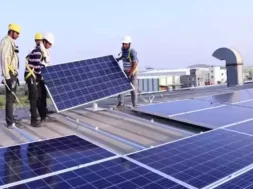
Ministry exploring large-scale solar power generation
KUCHING: The Ministry of Utilities is looking into incorporating large-scale solar energy into Sarawak’s power generation mix, with a projection of 4 per cent by 2030.
Permanent secretary Datuk Alice Jawan explained that Sarawak’s power generation mix is primarily sustainable, renewable, reliable, and affordable hydropower, complemented by indigenous coal and gas, with solar hybrid and micro hydro for off-grid generation in remote rural areas.
“Sarawak’s generation mix has transitioned significantly from predominantly fossil-based energy generation in 2010 to about 70 per cent hydropower today. Currently, solar generation is used to electrify remote rural villages as part of our off-grid solutions.
“In the near future, we are looking into incorporating more renewable energy like large-scale solar energy into our generation mix. This is projected to be about 4 per cent in 2030,” she said yesterday at the Malaysia Energy Efficiency and Solar Thermal Application (Maeesta) Project Seminar – a collaboration between the United Nations Industrial Development Organisation (Unido) and Sarawak Economic Development Corporation (SEDC).
Alice pointed out that Sarawak has challenging terrain and that the dispersed population throughout also makes it difficult for the main grid to reach the interior, therefore off-grid power generation is the best option for these remote rural areas.
She also shared about the Sarawak Alternative Rural Electrification Scheme (Sares), a government-funded community-owned alternative electricity generating solution using solar or micro hydro technology for about 300 of the most unreachable villages.
Alice said Sarawak Energy is the implementing agency for this award-winning initiative, which is an innovative model of government, agency, and community partnership.
“Sares’ technical team assists to train, address major faults in the systems, and provide periodical inspection. The completed systems are handed over to the community for operation and maintenance with support when required.
“The solar schemes are simple and easy to operate so that the villagers can run it at no charge. During the implementation phase, technicians are required to travel for long hours due to logistical problems. Heavy equipment and solar panels are transported through various means, typically by boat, four-wheel drives, and on foot uphill,” she explained.
She stressed that the ministry is fully committed to ensuring full electrification for all Sarawakians by 2025 through Sares and other rural electrification initiatives.
“Sarawak is receptive to the advancement of technology and innovation. We are exploring new and the latest technology for sustainable energy development.
“Through using renewables, we will improve the quality of life for all Sarawakians.
“This is in line with the United Nations’ Sustainable Development Goals,” she said, adding that the ministry welcomes new proposals.
Unido-Maeesta national project manager Dr Azmi Idris explained Maeesta seeks to reduce greenhouse gas emissions in targeted industry sub-sectors by implementing thermal energy efficiency and applying the solar thermal system.
“Since many of those attending the half-day seminar are from industries using heat in the factory manufacturing processes, I hope that the seminar will enable all the participants to have better understanding on the opportunity that solar thermal technology can provide, the investment opportunities, and also the incentives available so that the companies can decide whether they would like to install solar thermal system at their factory.
“Unido will provide 30 per cent financial assistance of the solar thermal system value and energy audit cost is covered by the project,” he said.















